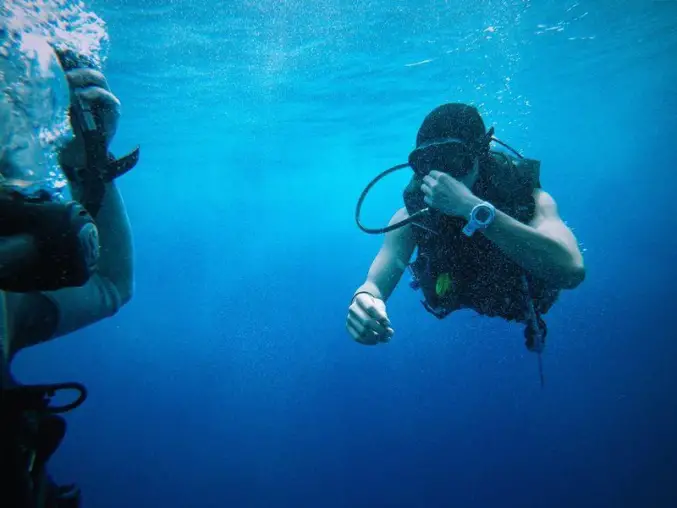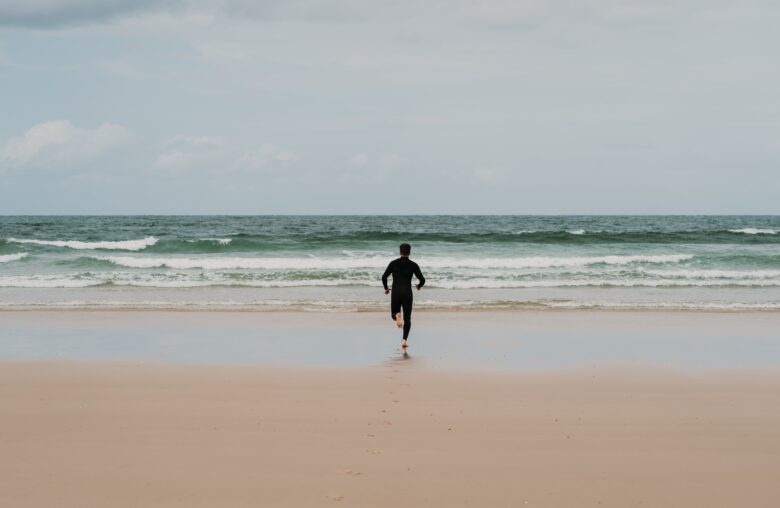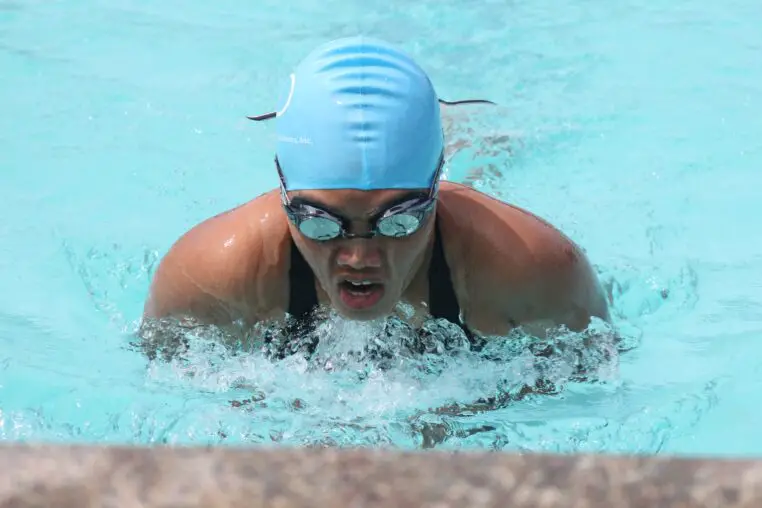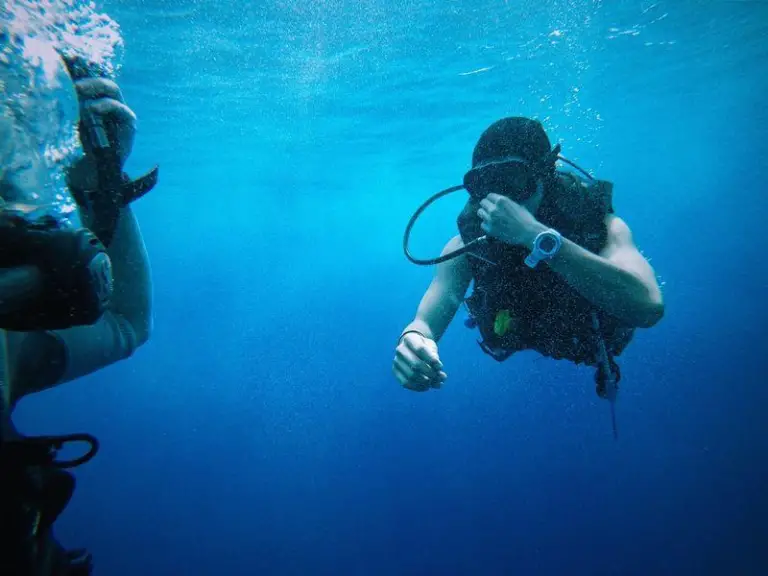
Picture yourself at the pool or beach, surrounded by cool, refreshing water, basking in the joy of swimming.
It’s easy to forget that you’re engaged in a physically intense activity, and the deceptive water around you masks the signs of dehydration. But could swimming really lead to dehydration? The answer may surprise you.
While swimming, you may not realize it, but you’re still at risk of dehydration. As your body sweats and expels fluids, this loss can be concealed by the aquatic environment.
Without replenishing these lost fluids with sips of water or a sports drink, swimming can indeed dehydrate you.
In this comprehensive exploration, we will uncover the causes of swimming-induced dehydration, how to identify its signs, and essential tips for staying properly hydrated while enjoying this beloved activity.
Understanding the Impact of Swimming on Hydration
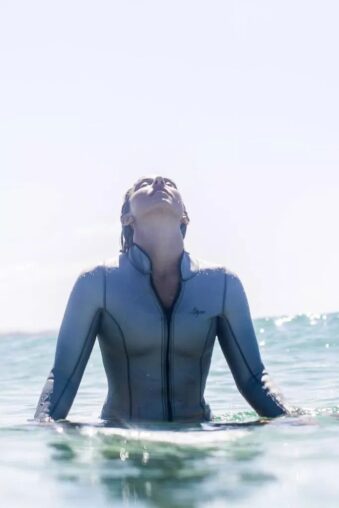
Subtle DehydrationThe Unseen Culprit
Swimming is an enjoyable way to stay active and lead a healthy lifestyle. Perhaps due to its recreational nature, it’s easy to forget about staying hydrated during your aquatic adventures. However, swimming places unique demands on your body that can often go unnoticed.
As you glide through the water, your body expends energy, leading to increased metabolic activity. This physical effort, combined with the need for a heightened respiration rate, results in fluid loss. Sweating during swimming may not be as apparent as it is during other forms of exercise, thanks to the aquatic setting.
But this lack of visibility doesn’t diminish the risk of dehydration. While you swim, your body generates heat, and this heat, combined with your body’s natural cooling mechanism, causes you to lose fluids through evaporation.
It’s crucial to be vigilant and watch for telltale signs of dehydration, including:
- Thirst
- Dark yellow urine
- Fatigue
- Dizziness
- Headaches
Tips for Staying Hydrated in the Water
Maintaining proper hydration during swimming is a must. To ensure your safety and enhance your performance, consider adopting these essential tips:
Regular Water Intake
Form a habit of drinking water before, during, and after your swim. Waiting until you feel thirsty is a clear indication that you’re already dehydrated.
Monitor Urine Color
Keep an eye on the color of your urine. Ideally, it should be a pale yellow, indicating that you are sufficiently hydrated. Dark yellow urine signals dehydration, and in such cases, increase your water intake.
Electrolyte Replacement
In cases of intense or prolonged swimming sessions, water alone may not suffice to replace lost fluids. Consider integrating a sports drink into your hydration routine to replenish vital electrolytes.
Adapt to Your Environment
If you’re swimming in a warm or humid climate, the risk of dehydration is higher. Pay attention to your body’s water requirements and adjust your intake accordingly.
Factors Influencing Dehydration in Swimmers
Body Temperature and Physical Exertion
Swimming raises your body temperature as a result of the physical effort involved. Consequently, your body sweats to regulate your internal temperature, leading to fluid loss and potential dehydration.
Water Temperature and Pool Conditions
The temperature of the water you swim in can significantly impact your hydration levels. Cooler pool water helps maintain your body temperature, reducing sweat production. In contrast, swimming in excessively warm pool water can lead to increased sweat and dehydration.
When swimming outdoors, factors like sunlight, humidity, and air temperature should also be considered, as they can influence your body’s response to exercise and fluid loss.
Individual Needs and Medical Conditions
Each person is unique, and individual needs and medical conditions play a significant role in determining how susceptible you are to dehydration while swimming.
Some individuals may have a higher sweat rate due to their unique physiology, making them more vulnerable to dehydration. Moreover, certain medications and underlying medical conditions can affect how your body manages fluids during physical exertion.
If you have a medical condition, especially a severe one, it’s crucial to consult with a healthcare professional to assess the safety of swimming. Dehydration might not be your primary concern, so working closely with a doctor is advisable.
The key to minimizing dehydration risks during swimming lies in adopting a comprehensive approach to hydration. Regularly hydrate yourself before, during, and after your swimming sessions, paying close attention to your body’s signals, such as thirst and fatigue, and adjusting your fluid intake accordingly.
The Impact of Dehydration on Performance and Well-being
Dehydration isn’t just an uncomfortable state; it can profoundly affect your physical performance and overall health. When you’re dehydrated, you’re likely to experience fatigue, hampering your ability to complete regular activities. Your muscles might also suffer, resulting in cramps and a noticeable decrease in strength.
Dehydration can further manifest as disorientation or confusion, impacting your decision-making abilities. This is especially hazardous during physical activities, increasing the risk of injuries, including muscle strains or sprains.
In extreme cases, severe dehydration can progress to heat exhaustion or heatstroke, life-threatening conditions that demand immediate medical attention. Remember that while swimming, you remain susceptible to dehydration, emphasizing the significance of maintaining hydration even when you’re in the water.
Separating Dehydration Myths from Facts in Swimming
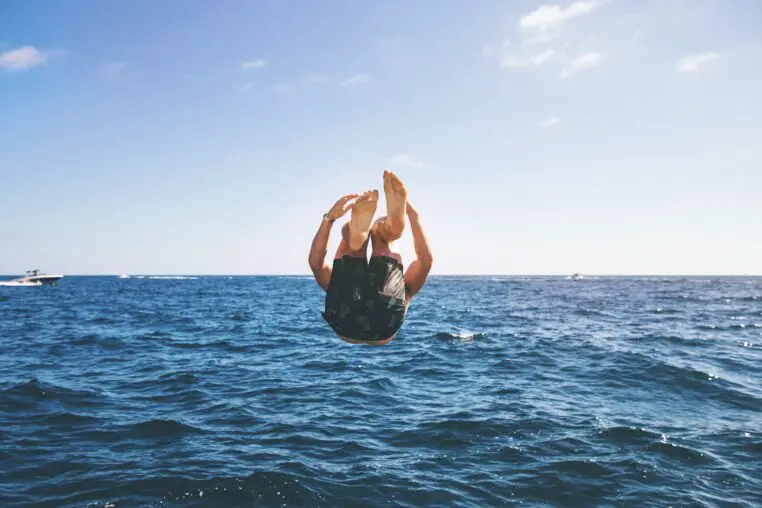
There’s a myriad of information out there about the connection between dehydration and swimming, and it’s essential to distinguish myths from facts.
Myth: You can’t get dehydrated while swimming.
Fact: Even though you’re surrounded by water, your body can lose fluids through sweat and respiration, resulting in dehydration during swimming.
Myth: Swimmers don’t sweat in the water.
Fact: Swimmers do sweat, but it’s not as noticeable because they are immersed in water. Sweating remains one of the body’s cooling mechanisms, active even during swimming.
Myth: Drinking seawater can prevent dehydration.
Fact: Drinking seawater exacerbates dehydration due to its high salt content, which can increase thirst and harm your kidneys.
Myth: Thirst is always a reliable indicator of dehydration.
Fact: Thirst is not a foolproof indicator of dehydration. In many cases, you might already be mildly dehydrated by the time you experience thirst.
Myth: Dehydration doesn’t significantly impact swimming performance.
Fact: Dehydration can lead to fatigue, reduced coordination, and diminished endurance, all of which significantly affect swimming performance.
Myth: You only need to drink water if you’re swimming in a hot environment.
Fact: In cooler water, your body can still lose significant fluids and salts through sweating. Therefore, it’s vital to stay hydrated, regardless of the water temperature.
Myth: Alcohol or coffee hydrates you before swimming.
Fact: Alcohol and coffee act as diuretics and can exacerbate dehydration by increasing urination, leading to greater fluid loss.
Frequently Asked Questions
Can you sweat while swimming, and does that cause dehydration?
Yes, you can sweat while swimming, and this can lead to dehydration if you fail to replenish the lost fluids. Swimming requires physical effort and generates heat, which increases your sweat production. Without adequate fluid replacement, dehydration can occur.
Does swimming in saltwater dehydrate you more than in freshwater?
Swimming in saltwater doesn’t necessarily dehydrate you more than swimming in freshwater. However, the risk of dehydration can be higher if you swallow saltwater or expose yourself to prolonged sun and heat exposure.
Staying properly hydrated remains essential whether you’re swimming in saltwater or freshwater.
Does dehydration increase the risk of cramps or injuries while swimming?
Yes, dehydration can significantly increase the risk of cramps and injuries during swimming. Dehydrated muscles are less efficient and more prone to cramps, strains, or other injuries.
Maintaining proper hydration is crucial to ensuring that your muscles function efficiently, reducing the likelihood of cramps or injuries during your swim.
Conclusion
Dehydration while swimming is not a myth. The body’s ability to sweat persists even when submerged in water. It’s crucial to understand the signs of dehydration, such as increased thirst, dark urine, fatigue, dizziness, and headaches, and to counteract them with an efficient hydration plan.
By adopting fundamental hydration practices, such as drinking water regularly, monitoring urine color, replenishing electrolytes, and adapting to your environment, you can significantly reduce the risk of dehydration during your aquatic adventures.
It’s imperative to be aware of how factors like body temperature, water temperature, and individual needs influence your risk of dehydration while swimming.

